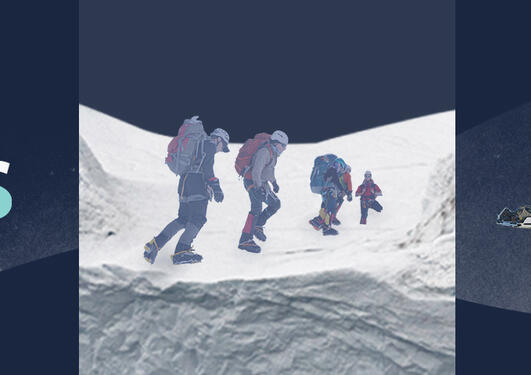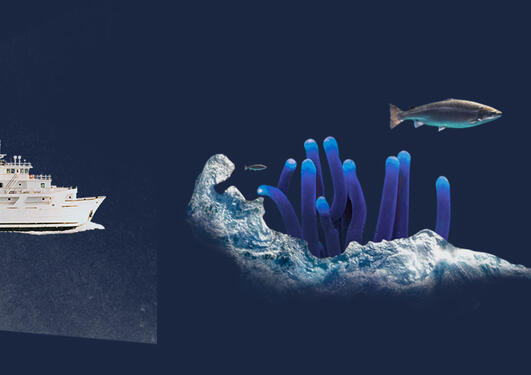Research possibilities for the MSCA SEAS postdoctoral research fellow in mathematical and statistical methods for marine sustainability
The information on this page is a supplement to the complete advertisement of the position in the recruitment-portal Jobbnorge. The full advertisement of this position in Jobbnorge will be available after august 1, and linked from this webpage. Call deadline is October 31, 2022.
Main content
Key information
One position | SEAS postdoctoral research fellow at Department of mathematics |
Jobbnorge title | MSCA SEAS postdoctoral research fellow in mathematical and statistical methods for marine sustainability |
Topical frame | Mathematical and statistical methods for marine sustainability (3 possible thematic sub-areas) |
Available supervisors | 1) Guttorm Alendal, 2) Iain G. Johnston, 3) Hans J. Skaug |
Mobility | For an incoming or outgoing candidate |
Unit of employment | Department of mathematics at University of Bergen |
Group affiliation(s) | Depending on project |
Thematic area and contact
This position is within the area of mathematical and statistical methods for Marine Sustainability.
The position is open to either an incoming or an outgoing candidate, see mobility rules.
The successful candidate will be employed at the Department of Mathematics and, depending on project, be included in the Statistics or the Fluid Mechanics research group.
Available thematic areas and supervisors:
- Marine environmental modelling and monitoring, Supervisor: Professor Guttorm Alendal
- Predicting robustness of marine organisms to environmental change using data and simulation, Supervisor: Associate Professor Iain G. Johnston
- Estimation of spatio-temporal variation in marine species distribution - Spatially clustered point processes for marine ecology,
Supervisor: Professor Hans J. Skaug
Information about the possible project themes, supervisors, research group and research possibilities for the fellow is available below. For further details about the research possibilities please contact the relevant supervisor(s).
Research possibilities and resources
As a result of today’s extraordinary advances in technology, marine research has become more and more quantitative. Classical qualitative descriptions can nowadays be much more precisely quantified and better predictions can be made. Modern sensors have opened the door to the collection of large datasets, so that advanced modeling tools and the development of mathematical/statistical methods have become indispensable for state-of-the-art marine research. In what follows, we describe some project areas in which we contribute and strengthen the SEAS thematic goal. These projects can be used as a starting point towards a research proposal plan. The final research plan will be elaborated by the candidate in cooperation with the project supervisor and the research group involved.
Project 1: Marine environmental modelling and monitoring
We are open for project ideas within the broad topic of marine process modelling and environmental monitoring.
For several years, the Fluid Mechanics group has been involved in national and international projects related to marine process modelling, focusing on monitoring the marine environment. Through our involvement in dCod 1.0,[1] using the Atlantic Cod as a canary bird for the marine environment, we have built up expertise in biological modelling, data analysis of omics data, and work in cross-professional projects.
The Institute is partner in two newly established Centers for Research Based Innovations, CRIMAC [2]and Smart Ocean[3]. In the former, machine learning techniques will be used to classify fish stocks from broadband acoustics using machine learning techniques. This work will be done in close collaboration with the Institute of Marine Research. In Smart Ocean we work with uncertainty quantification and design of marine monitoring programs.
For many years, the institute has been an international player in research on marine monitoring related to underground storage of CO2 offshore. Among others, through two EU projects, ECO2[4] and STEMM-CCS[5], and the ongoing ACTOM[6] project. ACTOM, which we also coordinate, is a very interdisciplinary project, with expertise in law, marine chemistry, modelling of flow in porous media, marine monitoring and instrumentation, RRI and not least ocean modelling.
An extensive national and international scientific network is available, locally (e.g., Institute of Marine Research, Nansen Environmental and Remote Sensing Centre and NORCE) and internationally (e.g., Plymouth Marine Laboratory, National Oceanography Centre in Southampton and GEOMAR in Germany). Other sectors include industry contacts (e.g., OCTIO, Equinor) and governmental agencies (e.g., the Norwegian Environment Agency, the Norwegian Petroleum Directorate).
- Contact: Guttorm Alendal, guttorm.alendal@uib.no
- Research group: Fluid dynamics
- Co-supervisors can come from Geophysical Institute, Department of Biological Sciences or Department of Physics and Technology, or from Faculty of Law, Faculty of Medicine, or from Western Norway University of Applied Sciences, NORCE or any of the local institutes.
Project 2: Predicting robustness of marine organisms to environmental change using data and simulation
This interdisciplinary project will combine approaches from mathematical modelling, bioinformatics, and statistics to develop new ways of predicting how marine organisms will respond to environmental changes. The researcher will join a dynamic ecosystem including collaborations with biomathematicians, toxicologists, computational biologists, and more. Human activities are changing ocean physics, chemistry, and biology. Information on how marine organisms respond to these changes is vital to understand the consequences of human actions, and to inform policy that may mitigate these perturbations. However, experimental approaches characterizing the wide range of effects that combinations of factors may have on different organisms are challenging. This project will complement ongoing experimental work with theoretical study, informed by bioinformatic data, of how marine organisms will respond to these physical and biological changes. It is anticipated that the approaches taken will include population genetics and modelling (to study how a “reservoir” of genetic diversity can allow adaptability in marine species), metabolic modelling (to study the within-organism implications of different temperatures and chemical stimuli), and stochastic modelling (to account for the necessarily noisy nature of these complex biological systems). We will also employ tools from statistical inference and model selection to select, parameterize, and validate these models with diverse existing data, and with emerging data from our collaborations with experimental biologists.
- Contact: Iain G. Johnston, email: iain.johnston@uib.no
- Research group: Stochastic Biology Group (group website https://org.uib.no/stochasticbiology/)
- Scientific collaborations with Emory University, USA (Matthew Gribble) and within UiB (Anders Goksøyr, Andreas Hejnol).
Translational collaborations within UiB on Responsible Research and Innovation and policy connections for marine management (Dorothy Dankel, Mimi Lam) - Co-supervisor at Department of Biology, UiB and/or Computational Biology Unit, UiB
Project 3: Estimation of spatio-temporal variation in marine species distribution - Spatially clustered point processes for marine ecology
The goal of this interdisciplinary project will be to adapt and develop state-of-the-art spatio-temporal statistical methods for fisheries and marine mammal line transect data. Statistical tools will include Gaussian Markov random fields (GMRFs), to account for spatial correlation, and the software package TMB (Template Model Builder) for fitting models to data. A possible topic is also Markov Modulated Point Processes (MMPPs) for clustered line transect data. The candidate will receive supervision from an experienced mentor in statistical ecology and statistical computation and have access to unique datasets on fish stocks and marine mammal populations.
- Contact: Hans J. Skaug, email: Hans.Skaug@uib.no
- Research group: Statistical Ecology.
- Collaboration with Institute of Marine Research in Tromsø (mentor: Martin Biuw)
- Co-supervisor at Department of Biology, UiB.
[1] https://www.uib.no/en/dcod
[2] https://www.hi.no/en/hi/forskning/projects/crimac
[3] https://www.uib.no/en/smartocean
[4] https://www.eco2-project.eu/
[5] https://www.stemm-ccs.eu/
[6] https://actom.w.uib.no/
See the full advertisement in Jobbnorge
The full advertisement in Jobbnorge will be available from august 1, 2022, until call deadline October 31.
Important general information
Please be aware
- That until August 1st 2022 (official call opening), the information on this page must not be considered as final, as adjustments may be done! There might also be minor adjustments in the Guide for applicants and the templates needed for applying.
- That the application process is time-demanding and requires a close dialogue with name-given available faculty supervisor or contact who, close to the deadline, must sign a supervisor match declaration if an application is to be eligible.
- That some fields of research, especially within sensitive technology areas, might be enforced by Norwegian and international regulations regarding Control of the Export of Strategic Goods, Services and Technology. Candidates who by assessment of the application and attachment are seen to conflict with the criteria in these regulations might be prohibited from recruitment to UiB.

